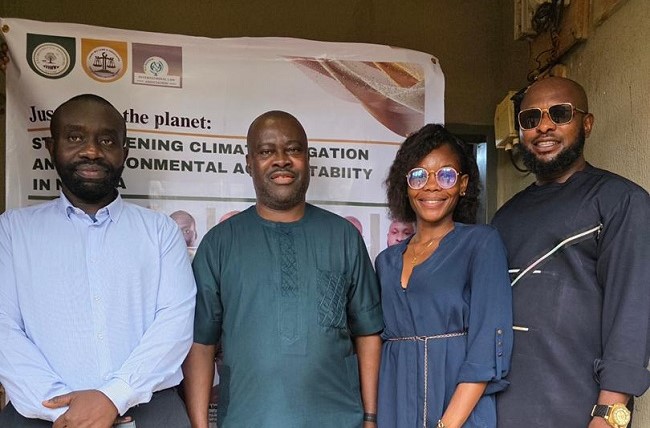Environmental activists and legal practitioners are calling for unity in the pursuit of environmental accountability in Nigeria and want Nigerians to utilise the ongoing constitutional amendment exercise to demand for a review of the environmental laws in the country. They reject a system that puts absolute power over Nigeria’s natural resources in the hands of the federal government, abandoning the victims of oil and gas pollution in local communities.

This was their position at a one-day hybrid programme organised by Environmental Defenders Network (EDEN), in collaboration with the Nigeria Chambers of the International Law Association and the Chima Williams and Associates at EDEN Head office in Benin City, Edo State.
The programme explored the negative impacts of climate change on local communities, the role of polluting corporations and how the Nigerian constitution has aided pollution, derailing environmental accountability.
Executive Director of EDEN, Barr. Chima Williams, who spoke on “The Drive Towards Climate Justice and Environmental Accountability” highlighted parts of the Nigerian constitution that place utmost power on the federal government, inhibiting the state and regulatory agencies and citizens’ right to demand environmental accountability from polluting corporations.
“There are provisions of the Constitution that put petroleum resources under the exclusive legislative list of the constitution, which means it is only the federal government that can regulate it. This has also denied states legislatures and the judiciary from having anything to do or say about petroleum issues. Our constitution has bestowed on the federal government the right over all our mineral resources. These policies do not provide openings that ensure that our environment is well protected or accountability in our environment sector. So the starting point is our very constitution.”
Expanding on issues concerning “Community Organizing for Climate Resilience”, Deputy Executive Director, Comrade Alagoa Morris, highlighted the increasing impact of climate change in the Niger Delta, manifested in increased rainfall and severe flooding such as was experienced in 2022. He explained that rural communities are struggling to adapt to climate change, with farmers replanting quickly between floods to avoid food insecurity.
He revealed that the pollution crisis in the Niger Delta is further compounded by the actions of the military and NNPC surveillance contractors, who burst containers of illegally acquired crude oil and refined products, flooding the environment with toxic hydrocarbon contents.
“These agents also set ablaze boats, vessels, and trucks transporting suspected stolen or illegally refined crude oil, which further denies the people of the Niger Delta clean air and water.”
He noted that while lawyers are often ready to support communities in seeking environmental justice, the scientific community is not providing sufficient backing through research, limiting the ability of communities to hold polluters accountable, and allowing companies to escape liability despite visible evidence of pollution on the ground.
EDEN’s Director of Programmes, Philip Jakpor, spoke on the place of the “Media in the Nigerian Climate Change Narrative”, pointing out that the role of the media is to document and shape public perception and the understanding of climate change, serving as a bridge between complex research findings and policymakers as well as the general public.
“For climate coverage to have real impact, stories should revolve around the immediate environment, such as agriculture, water stress in rural and urban areas, and rising temperatures. We need to tell the stories of people affected by climate change, including communities, women, children, vulnerable groups, and workers, while linking these stories to local and national economic impacts in clear and understandable terms. It is important to spotlight the fossil fuels companies behind the climate crisis as well as agro-industrial plantation companies.”
Speaking on “Maximising Global Climate Movements to Combat Climate Crisis”, EDEN’s Director of Climate and Energy Justice, Maimoni Ubrei-Joe, said the essence of climate justice movements is to keep individuals, governments, and industries accountable while redirecting the world toward climate action.
He explained that there are several global movements that have been instrumental in mass mobilisation, protests during COPs, bilateral engagements, policy advocacy, and legal actions.
“The challenges in climate justice organizing are greenwashing, false solutions, and distractions such as geoengineering, the carbon market, and waste-to-energy initiatives. These approaches delay real climate action and are often reflected in existing policies. While some call for new laws, there is a need to clean up the current laws so they reflect and protect the interests of the ordinary people. There is a need to demand divestment from fossil fuels and to channel resources into renewable energy.”
On his part, Associate Professor of International and Environmental Law from the University of Derby, UK, Dr. Eghosa Ekhator, pointed out that climate laws are not effective in Nigeria. He stressed that the impact of climate change weighs more on the vulnerable people in society.
“The African character has been part of Nigerian law since 1983. There are very few environmental justice cases. We need the expertise of scientists. We need local communities who are the real victims to start talking about environmental and climate justice.”
He charged civil society organisations and environmental activists to start developing the capacity of local communities for climate litigation and build their knowledge to realise that they can seek for environmental justice and accountability through the court.
Other speakers at the event included Eric Omare Esq, a legal practitioner who highlighted the role of the Petroleum Industry Act and how local communities can apply it in litigation processes. Professor of Environmental law, University of Benin, Prof. Ngozi Stewart, pointed out the need to move from law to impact by strengthening climate litigations and environmental governance. Senior lecturer of the Faculty of Law, Delta State University, Dr. Brown Umukoro, exposed the potential of children and youth focused climate litigations that maximises the impact of climate change on the younger generation.
The programme which was both in-person and virtual was attended by civil society organisations, women led groups, environmental activists, legal practitioners and the media.
